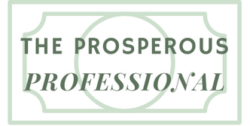When I made the decision to move to a reduced schedule, my head was flooded with emotions and doubts about my taking such a significant move in my career. At the time of making that decision, I had spent all of my twenties working to develop and advance my career which often meant sacrifices. Working in public accounting for that long certainly presents with you numerous opportunities for growth and advancement but it also can mean sacrifices with family, friends, personal well-being, and health.
A little background…
Since high school, my plan had been to pursue a career in accounting, obtain my CPA license, and work my way up the ladder to being a partner in public accounting. I would say that my plan was fairly straightforward and methodical. I knew exactly what my next steps would be. In college, I did the standard public accounting internships, studied and passed the CPA exam, worked for one of the Big 4 public accounting firms for two years and then moved to a mid-market firm. I worked with wonderful individuals who poured into my development, both technically and professionally. So when I reached a point in my career when I wanted to focus on some other things outside of my career in public accounting, it was a tough decision. I felt as though I was disappointing the people around me and I questioned whether my reasons were good enough. Today, I thoroughly enjoy this new balance that I’ve struck by working a reduced schedule and I’m here to talk about some of those benefits.
1. Improved Work Life Balance
This is, without a doubt, the most significant and readily apparent benefit of working a reduced schedule. By spending fewer hours at my desk and more time away from work, I’ve gained the opportunity to focus on various aspects of my life that I consider just as important—if not more so—than my professional responsibilities. For example, I now have the time to dedicate to my personal health, both physical and mental, which is crucial for overall well-being. Prioritizing exercise, proper nutrition, and mental health practices has allowed me to feel more energized, balanced, and at peace.
In addition, having more time and mental energy has enabled me to create a home environment that is not only welcoming and comfortable but also conducive to my well-being. I can now invest in making my living space a sanctuary, where I can truly unwind and recharge. Beyond health and home, this additional time has given me the freedom to explore new passions and hobbies that I might not have had the opportunity to pursue in the past. Whether it’s picking up a new skill, diving into a creative project, or simply exploring interests I’ve always wanted to try, having more time outside of work allows me to broaden my horizons in ways that enhance my life in a fulfilling and meaningful way.
Moreover, this change has given me something even more important: mental space. Not only do I have the time to engage in these personal pursuits, but I also have the clarity and mental bandwidth to fully immerse myself in them. This means I can be present for myself, truly focusing on what I need and want, as well as being present for those around me—whether it’s family, friends, or even coworkers. By reducing the demands of my professional life, I’ve created the mental and emotional space to cultivate a richer, more balanced existence, where I can invest in my well-being and the relationships that matter most to me.
2. Improved Focus at Work
I have found that by limiting the number of hours that I’m available to be working as resulted in me being much more intentional and focused in my time at work. If I know I only have a half a day to get X, Y, or Z done, I am much more intentional in creating a plan that allows me to execute on that. Having more limited hours of availability also forces you to protect your “yes”. Too often, we are asked to do things and the reflexive answer is “yes”, out of a concern that we will miss out on an opportunity or let others down. However, in life and at work, saying “yes” to too many things dilutes the power of your “yes”. So saying “no” to some things that don’t align with your goals and your vision is so important in order to make your Yes’s that much more impactful and meaningful.
3. Learning to Set Boundaries
This is a particularly challenging one for me, and it ties in with what I mentioned earlier. Learning to say “no” and to protect your time to things and protect your time is crucial in establishing your boundaries and having a successful reduced work schedule, but it can also make you feel like you are disappointing people. As I mentioned earlier, just going to the reduced schedule made me feel as though I was letting people down. So learning to set boundaries that protect yourself and your time are key to having a successful reduced schedule arrangement.
In the business world and especially as you move into more of a management position, you find yourself fielding questions from staff, partners, clients, and other stakeholders all day long. And while it is important to be available to those stakeholders to keep projects and initiatives moving, it can sometime become a barrier to providing you with the necessary time to focus on your own work.
One strategy I’ve found incredibly helpful is scheduling specific times during the day when staff and other team members can come to me with questions or concerns. There are a few ways you can structure this. You can set up formal meetings in your calendar with designated team members, or you could implement “office hours,” just like your professors did in college. Setting aside a block of time for these interactions allows you to give your full attention to your team without constantly being distracted throughout the day. It also helps ensure that when you’re working on your own tasks, you can stay focused and efficient.
4. Bringing a new Energy to the Workplace
I have found that when I’m pouring new passions and health pursuits into my life regularly, I am able to bring my best energy to work. I find that I am able to be a much more positive influence to those around me and serve my teams and clients much better. I found that when I was pushing my hours at the maximum, I was not bringing a positive version of myself and certainly wasn’t bringing energy to my team. I felt run down.
5. Opportunity to Pursue new Passions and Business
Taking a pay cut can be a significant consideration when looking at options to go on a reduced schedule arrangement. That was a big consideration when I was making the decision. However, the other side to this is that it opens up your time to pursue other side hustles with your additional time. There are so many freelance and contract work arrangements that you can find on places like Upwork to help fill in the gaps financially to allow you to still move to a reduced schedule. Some of my favorite resources for pursuing outside work to help fill in the gaps are Indeed, Upwork, and Flex Jobs.
6. Flexibility to Work When Most Productive
Everyone has a sweet spot for when they are most productive. I personally tend to be more of a morning person while I know others are not. With a reduced schedule, you have a little more autonomy to determine what your working hours will be so that you can maximize your productivity during your best hours of the day.
Part-time work or reduced schedule arrangements offer a wide range of benefits, not just limited to work working fewer hours. It enables a healthier work-life balance, allowing you to focus on your well-being and the well-being of those around you. With improved focus, you are able to bring your best self and highest energy to the workplace. It can also allow you the opportunity and time to pursue new passions and interests that could very well turn into a new career for you!

